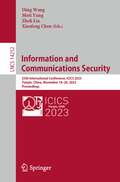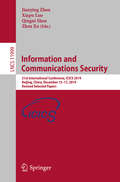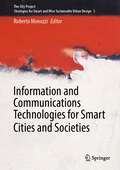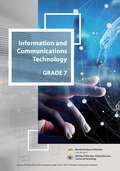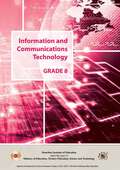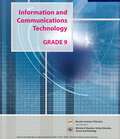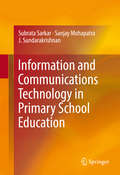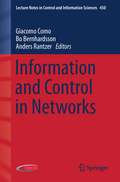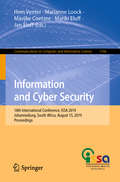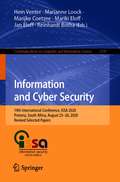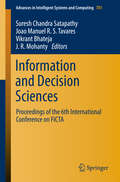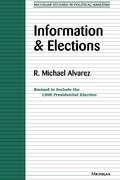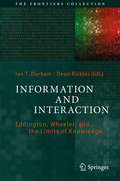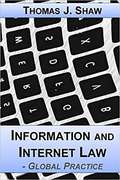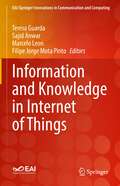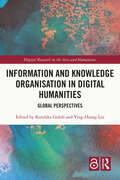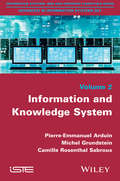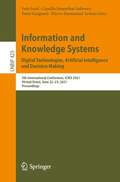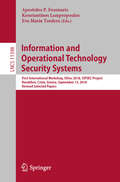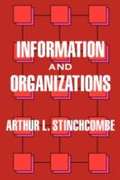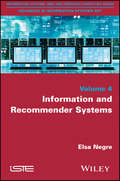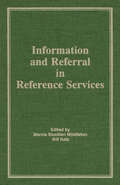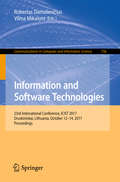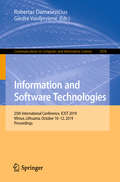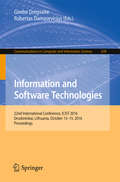- Table View
- List View
Information and Communications Security: 25th International Conference, ICICS 2023, Tianjin, China, November 18–20, 2023, Proceedings (Lecture Notes in Computer Science #14252)
by Ding Wang Moti Yung Zheli Liu Xiaofeng ChenThis volume LNCS 14252 constitutes the refereed proceedings of 25th International Conference on Information and Communications Security, ICICS 2023, held in Tianjin, China, during November 18–20, 2023. The 38 full papers presented together with 6 short papers were carefully reviewed and selected from 181 submissions. The conference focuses on: Symmetric-Key Cryptography; Public-Key Cryptography; Applied Cryptography; Authentication and Authorization; Privacy and Anonymity; Security and Privacy of AI; Blockchain and Cryptocurrencies; and System and Network Security.
Information and Communications Security: 21st International Conference, ICICS 2019, Beijing, China, December 15–17, 2019, Revised Selected Papers (Lecture Notes in Computer Science #11999)
by Jianying Zhou Xiapu Luo Qingni Shen Zhen XuThis book constitutes the refereed proceedings of the 21th International Conference on Information and Communications Security, ICICS 2019, held in Beijing, China, in December 2019. The 47 revised full papers were carefully selected from 199 submissions. The papers are organized in topics on malware analysis and detection, IoT and CPS security enterprise network security, software security, system security, authentication, applied cryptograph internet security, machine learning security, machine learning privacy, Web security, steganography and steganalysis.
Information and Communications Technologies for Smart Cities and Societies (The City Project #5)
by Roberto MenozziThis book offers an overview of digital, IoT and intelligent technologies, applications and solutions that are contributing to shape the digital, inclusive, and sustainable transformation of contemporary cities. Based on peer-reviewed contributions to the workshop "Information and Communications Technologies for Smart Cities and Societies", held on December 2, 2022, at the University of Parma, Italy, it offers a multidisciplinary, authoritative snapshot for researchers, architects, and engineers, as well as professionals and policy makers, involved in planning the city of the future. The book describes practical case studies, discussing challenges and opportunities of the integration of ICTs in the planning and management of future cities.
Information and Communications Technology class 7 - MIE
by Mauritius Institute of EducationThe Grade 7 ICT textbook for students in Mauritius is a comprehensive guide designed to facilitate a smooth transition from Grade 6, focusing on key competencies, knowledge, skills, attitudes, and values in Information and Communications Technology (ICT). The textbook's eight units cover diverse ICT topics, including computer operations, the Internet, word processing, spreadsheet, presentation, multimedia, and problem solving. Each unit is structured with activities, quick tests, summative exercises, and end-of-unit questions. An engaging feature is the introduction of an avatar named Tipiyu, providing guidance throughout the book. The curriculum emphasizes fundamental ICT principles, safety, ethics, and practical skills in areas such as programming using Scratch. The textbook aims to make learning accessible, empowering, and enjoyable for Grade 7 students, acknowledging the contributions of various stakeholders in its development.
Information and Communications Technology class 8 - MIE
by Mauritius Institute of EducationThe "Information and Communications Technology - Grade 8" textbook, published by the Mauritius Institute of Education in 2021, encompasses nine units covering a wide array of ICT topics. Aimed at Grade 8 students, it delves into fundamental aspects like computer operations, word processing, presentations, spreadsheets, internet usage, multimedia, health, safety, ethics, practical problem-solving, programming, and databases. Serving as a comprehensive guide, it equips students with a strong foundational understanding of ICT principles and skills crucial in today's world. The textbook's clarity and concise presentation facilitate easy comprehension, allowing students to grasp concepts effortlessly. With its detailed coverage and accessible language, this resource proves invaluable for students seeking to explore and comprehend the applications and significance of ICT in the modern era.
Information And Communications Technology class 9 - MIE
by Mauritius Institute of EducationThe Grade 9 ICT workbook is meticulously crafted to align with the National Curriculum Framework, recognizing the pivotal role of digital literacy in today's evolving landscape. With a strategic focus on technology's exponential growth, the workbook unfolds across nine comprehensive units, ranging from fundamental computer operations to practical problem-solving and programming. Through a learner-centric approach, the workbook amalgamates theoretical concepts with engaging practical activities, employing games, and exercises that foster hands-on learning experiences. Emphasizing continuous engagement, it encourages a year-long blend of theory and application. Symbolized guides like Tipiyu, carried over from previous grades, enrich the learning journey, while colored elements and symbols serve as aids, enhancing comprehension. Anchored in promoting ICT skills essential for a burgeoning knowledge society, this workbook primes students for the National Examination, nurturing their capacity to navigate digital environments, solve problems, and flourish in an increasingly tech-driven world.
Information and Communications Technology in Primary School Education
by Subrata Sarkar Sanjay Mohapatra J. SundarakrishnanThe main focus of this monograph is to discuss the role of technology in education in emerging markets considering that many countries have attempted to reform their educational systems using large scale interventions in the last two decades. Educational change can be prompted by two exact opposites in two different settings; for example, Western countries are faced with the problem of falling enrollments whereas developing countries have to adjust to rapid acceleration in enrollments. Based on the need to bring about change, these reforms subscribe to a large diversity including attempts at restructuring school systems, curriculum revisions, pedagogical change, technological change, assessment- related changes, work condition changes, and so on. Although there have been reforms in schools over the last century, they have been only first order classroom reforms; a 'deep-seated continuity' still persists in both schooling and teaching. Educational reforms are therefore plagued with different kinds of problems: the problem of successful initial change taking place, the problem of replicating successful change in varying contexts, and the problem of institutionalization or durability of the change. Readers will also discover that American India Foundation, having worked in the educational sphere for more than a decade, intends to transform the school ecosystem through its 'Digital Equalizer' Program (DE). The program strives to foster an environment of collaborative learning by effectively empowering teachers to use technology as a pedagogic tool leading to better learning outcomes among students of under-resourced schools across India. The author sheds new light on how the DE program is affecting change in the state of Odisha's education system and the adoption of new pedagogic teaching techniques.
Information and Control in Networks
by Giacomo Como Bo Bernhardsson Anders RantzerInformation and Control in Networks demonstrates the way in which system dynamics and information flows intertwine as they evolve, and the central role played by information in the control of complex networked systems. It is a milestone on the road to that convergence from traditionally independent development of control theory and information theory which has emerged strongly in the last fifteen years, and is now a very active research field. In addition to efforts in control and information theory, the text is witness to strong research in such diverse fields as computer science, mathematics, and statistics. Aspects that are given specialist treatment include: · data-rate theorems; · computation and control over communication networks; · decentralized stochastic control; · Gaussian networks and Gaussian-Markov random fields; and · routability in information networks. Information and Control in Networks collects contributions from world-leading researchers in the area who came together for the Lund Center for Control of Complex Engineering Systems Workshop in Information and Control in Networks from 17th-19th October 2012; the workshop being the centrepiece of a five-week-long focus period on the same theme. A source of exciting cross-fertilization and new ideas for extensive future research, this volume will be of great interest to any researcher or graduate student interested in the interaction of control and information theory.
Information and Cyber Security: 18th International Conference, ISSA 2019, Johannesburg, South Africa, August 15, 2019, Proceedings (Communications in Computer and Information Science #1166)
by Jan Eloff Hein Venter Marianne Loock Marijke Coetzee Mariki EloffThis book constitutes the refereed proceedings of the 18th International Conference on Information Security, ISSA 2019, held in Johannesburg, South Africa, in August 2019.The 12 revised full papers presented were carefully reviewed and selected from 35 submissions. The papers are dealing with topics such as authentication; access control; digital (cyber) forensics; cyber security; mobile and wireless security; privacy-preserving protocols; authorization; trust frameworks; security requirements; formal security models; malware and its mitigation; intrusion detection systems; social engineering; operating systems security; browser security; denial-of-service attacks; vulnerability management; file system security; firewalls; Web protocol security; digital rights management; distributed systems security.
Information and Cyber Security: 19th International Conference, ISSA 2020, Pretoria, South Africa, August 25–26, 2020, Revised Selected Papers (Communications in Computer and Information Science #1339)
by Hein Venter Marianne Loock Marijke Coetzee Mariki Eloff Jan Eloff Reinhardt BothaThis book constitutes the refereed post-conference proceedings of the 19th International Conference on Information Security, ISSA 2020, which was supposed to be held in Pretoria, South Africa, in August 2020, but it was held virtually due to the COVID-19 pandemic.The 10 revised full papers presented were carefully reviewed and selected from 33 submissions. The papers deal with topics such as authentication; access control; digital (cyber) forensics; cyber security; mobile and wireless security; privacy-preserving protocols; authorization; trust frameworks; security requirements; formal security models; malware and its mitigation; intrusion detection systems; social engineering; operating systems security; browser security; denial-of-service attacks; vulnerability management; file system security; firewalls; Web protocol security; digital rights management; and distributed systems security.
Information and Decision Sciences: Proceedings Of The 6th International Conference On Ficta (Advances In Intelligent Systems And Computing #701)
by Suresh Chandra Satapathy Vikrant Bhateja J. R. Mohanty Joao Manuel TavaresThis book presents the proceedings of the 6th International Conference on Frontiers of Intelligent Computing: Theory and Applications (FICTA-2017), held in Bhubaneswar, Odisha. The event brought together researchers, scientists, engineers, and practitioners to exchange their new ideas and experiences in the domain of intelligent computing theories with prospective applications to various engineering disciplines. The book is divided into two volumes: Information and Decision Sciences, and Intelligent Engineering Informatics. This volume covers broad areas of Information and Decision Sciences, with papers exploring both the theoretical and practical aspects of data-intensive computing, data mining, evolutionary computation, knowledge management & networks, sensor networks, signal processing, wireless networks, protocols & architectures etc. The book also offers a valuable resource for students at the post-graduate level in various engineering disciplines.
Information and Elections
by R. Michael AlvarezR. Michael Alvarez examines how voters make their decisions in presidential elections. He begins with the assumption that voters have neither the incentive nor the inclination to be well-informed about politics and presidential candidates. Candidates themselves have incentives to provide ambiguous information about themselves, their records and their issue positions. Yet the author shows that a tremendous amount of information is made available about presidential candidates. And he uncovers clear and striking evidence that people are not likely to vote for candidates about whom they know very little. Alvarez explores how voters learn about candidates through the course of a campaign. He provides a detailed analysis of the media coverage of presidential campaigns and shows that there is a tremendous amount of media coverage of these campaigns, that much of this coverage is about issues and is informative, and that voters learn from this coverage. The paperback edition of this work has been updated to include information on the 1996 Presidential election. Information and Electionsis a book that will be read by all who are interested in campaigns and electoral behavior in presidential and other elections. "Thoughtfully conceptualized, painstakingly analyzed, with empirically significant conclusions on presidential election voting behavior, this book is recommended for both upper-division undergraduate and graduate collections. " --Choice R. Michael Alvarez is Associate Professor of Political Science, California Institute of Technology.
Information and Interaction
by Ian T. Durham Dean RicklesIn this essay collection, leading physicists, philosophers, and historians attempt to fill the empty theoretical ground in the foundations of information and address the related question of the limits to our knowledge of the world. Over recent decades, our practical approach to information and its exploitation has radically outpaced our theoretical understanding - to such a degree that reflection on the foundations may seem futile. But it is exactly fields such as quantum information, which are shifting the boundaries of the physically possible, that make a foundational understanding of information increasingly important. One of the recurring themes of the book is the claim by Eddington and Wheeler that information involves interaction and putting agents or observers centre stage. Thus, physical reality, in their view, is shaped by the questions we choose to put to it and is built up from the information residing at its core. This is the root of Wheeler's famous phrase "it from bit. " After reading the stimulating essays collected in this volume, readers will be in a good position to decide whether they agree with this view.
Information and Internet Law: Global Practice
by Thomas ShawThe worlds of today and tomorrow rely upon open networks connecting far-flung participants exchanging information both personal and commercial. Bringing some certainty to this very dynamic environment are the legal foundations supporting the free flow of information over the Internet. <p><p> New lawyers, lawyers new to information and Internet law, lawyers updating their knowledge on the latest statutes and cases, and lawyers desiring a global comparative legal perspective are among the audiences who require this single resource to consolidate their understanding of global information and Internet law. This book, up-to-date to March 2018, provides insight by looking at current statutes, regulations, and directives in the United States and Europe, supplemented by statutes in Asia and the Americas ex-U.S. It discusses and identifies issues raised by the latest U.S. and EU cases on protection of information and use of the Internet. <p><p> It starts with a risk-based, lifecycle approach to this area of law. The areas of information law addressed: privacy, information security, and data protection law, unlawful data disclosures through cybercrime and data breach, and lawful data disclosures related to messaging and surveillance. The areas of Internet law addressed: access, jurisdiction, speech, intermediary liability, intellectual property, and e-commerce through electronic and website agreements. Bringing a unique perspective to explain a complex topic, the author has written numerous books on legal technology and legal history, writes and speaks extensively on the latest developments in technology law, teaches U.S.-EU comparative law school courses on information, Internet, and emerging technologies law, and had worked in complementary disciplines across the major parts of the world. This book is the result of those many years of experience and insight.
Information and Knowledge in Internet of Things (EAI/Springer Innovations in Communication and Computing)
by Teresa Guarda Sajid Anwar Marcelo Leon Filipe Jorge Mota PintoThis book provides readers with an insight into information and knowledge in the Internet of Things, in particular an investigation of data management and processing, information extraction, technology, knowledge management, knowledge sharing, knowledge co-creation, knowledge integration, and the development of new intelligent services available anytime, anywhere, by anyone. The authors show how IoT enables communication and ubiquitous computing between global citizens, networked machines and physical objects, providing a promising vision of the future integrating the real world of knowledge agents and things with the virtual world of information.
Information and Knowledge Organisation in Digital Humanities: Global Perspectives (Digital Research in the Arts and Humanities)
by Koraljka Golub Ying-Hsang LiuInformation and Knowledge Organisation explores the role of knowledge organisation in the digital humanities. By focusing on how information is described, represented and organised in both research and practice, this work furthers the transdisciplinary nature of digital humanities. Including contributions from Asia, Australia, Europe, North America and the Middle East, the volume explores the potential uses of, and challenges involved in, applying the organisation of information and knowledge in the various areas of Digital Humanities. With a particular focus on the digital worlds of cultural heritage collections, the book also includes chapters that focus on machine learning, knowledge graphs, text analysis, text annotations and network analysis. Other topics covered include: semantic technologies, conceptual schemas and data augmentation, digital scholarly editing, metadata creation, browsing, visualisation and relevance ranking. Most importantly, perhaps, the book provides a starting point for discussions about the impact of information and knowledge organisation and related tools on the methodologies used in the Digital Humanities field. Information and Knowledge Organisation is intended for use by researchers, students and professionals interested in the role information and knowledge organisation plays in the Digital Humanities. It will be essential reading for those working in library and information science, computer science and across the humanities.
Information and Knowledge Systems
by Michel Grundstein Camille Rosenthal-Sabroux Pierre-Emmanuel ArduinThe purpose of this book is to question the relationships involved in decision making and the systems designed to support it: decision support systems (DSS). The focus is on how these systems are engineered; to stop and think about the questions to be asked throughout the engineering process and, in particular, about the impact designers' choices have on these systems. This therefore involves identifying the elements of the problem of decision support systems engineering: the main objects and dimensions to be considered and the relationships they involve, issues at the levels of the decision-maker, of the organization (and even of society), the general approach to which to subscribe and so on.
Information and Knowledge Systems. Digital Technologies, Artificial Intelligence and Decision Making: 5th International Conference, ICIKS 2021, Virtual Event, June 22–23, 2021, Proceedings (Lecture Notes in Business Information Processing #425)
by Inès Saad Camille Rosenthal-Sabroux Faiez Gargouri Pierre-Emmanuel ArduinThis book constitutes the thoroughly refereed proceedings of the 5th International Conference on Information and Knowledge Systems, ICIKS 2021, which was held online during June 22-23, 2021.The International Conference on Information and Knowledge Systems (ICIKS 2021) gathered both researchers and practitioners in the fields of Information Systems, Artificial Intelligence, Knowledge Management and Decision Support. ICIKS seeks to promote discussions on various organizational, technological, and socio-cultural aspects of research in the design and use of information and knowledge systems in organizations. The 10 full and 2 short papers presented in this volume were carefully reviewed and selected from 32 submissions. They were organized in topical sections as follows: knowledge systems and decision making; machine learning, recommender systems, and knowledge systems; and security, artificial intelligence, and information systems.
Information and Operational Technology Security Systems: First International Workshop, IOSec 2018, CIPSEC Project, Heraklion, Crete, Greece, September 13, 2018, Revised Selected Papers (Lecture Notes in Computer Science #11398)
by Apostolos P. Fournaris Konstantinos Lampropoulos Eva Marín TorderaThis book constitutes the refereed proceedings of the First International Workshop, IOSec 2018, sponsored by CIPSEC, held in Heraklion, Crete, Greece, in September 2018. The 12 full papers presented were carefully reviewed and selected from 22 submissions. They were organized in topical sections named: Critical Infrastructure Cybersecurity Issues; CyberSecurity Threats, Assessment and Privacy; and Vulnerability and Malware Detection.
Information and Organizations
by Arthur L. StinchcombeIn a mix of theoretical insights and anecdotal material, this book explores the ins and outs of organizations from both a macro and micro perspective that has long confronted business people and those interested in organizational theory.
Information and Recommender Systems
by Elsa NegreInformation is an element of knowledge that can be stored, processed or transmitted. It is linked to concepts of communication, data, knowledge or representation. In a context of steady increase in the mass of information it is difficult to know what information to look for and where to find them. Computer techniques exist to facilitate this research and allow relevant information extraction. Recommendation systems introduced the notions inherent to the recommendation, based, inter alia, information search, filtering, machine learning, collaborative approaches. It also deals with the assessment of such systems and has various applications.
Information and Referral in Reference Services
by Linda S KatzThis book investigates a wide variety of situations and models which fall under the umbrella of information and referral. It examines traditional views in public libraries and library systems as well as descriptions of programs in nontraditional settings, such as academic libraries. A human services perspective is explored and research models are presented.
Information and Software Technologies
by Robertas Damaševičius Vilma MikašytėThis book constitutes the refereed proceedings of the 23nd International Conference on Information and Software Technologies, ICIST 2017, held in Druskininkai, Lithuania, in October 2017.The 51 papers presented were carefully reviewed and selected from 135 submissions. The papers are organized in topical sections on information systems; business intelligence for information and software systems; software engineering; information technology applications.
Information and Software Technologies: 25th International Conference, ICIST 2019, Vilnius, Lithuania, October 10–12, 2019, Proceedings (Communications in Computer and Information Science #1078)
by Robertas Damaševičius Giedrė VasiljevienėThis book constitutes the refereed proceedings of the 25th International Conference on Information and Software Technologies, ICIST 2019, held in Vilnius, Lithuania, in October 2019.The 46 papers presented were carefully reviewed and selected from 121 submissions. The papers are organized in topical sections on information systems; business intelligence for information and software systems; information technology applications; software engineering.
Information and Software Technologies
by Giedre Dregvaite Robertas DamaseviciusThis book constitutes the refereed proceedings of the 20th International Conference on Information and Software Technologies, ICIST 2014, held in Druskininkai, Lithuania, in October 2014. The 34 papers presented were carefully reviewed and selected from 68 submissions. The papers are organized in topical sections such as information systems; business intelligence for information and software systems; software engineering; information technology applications.
